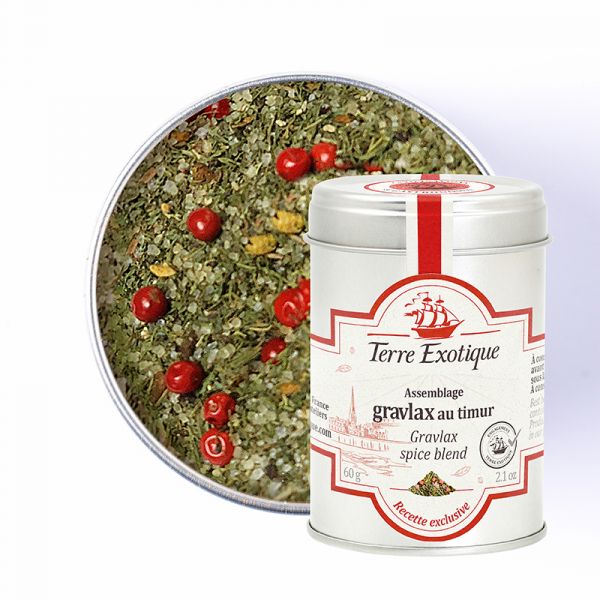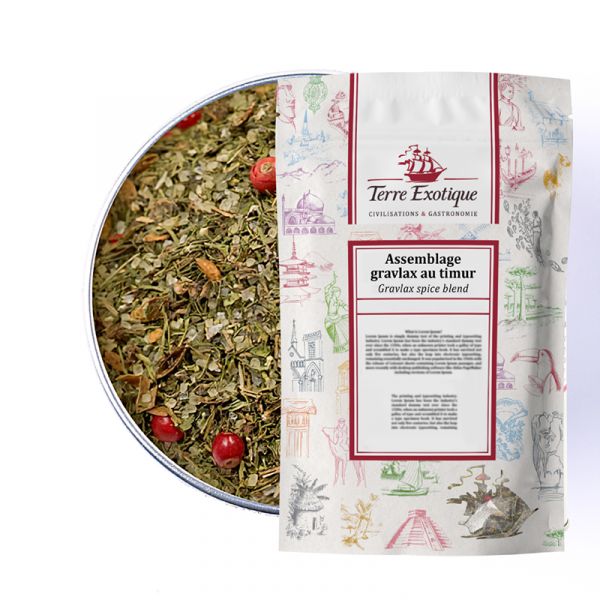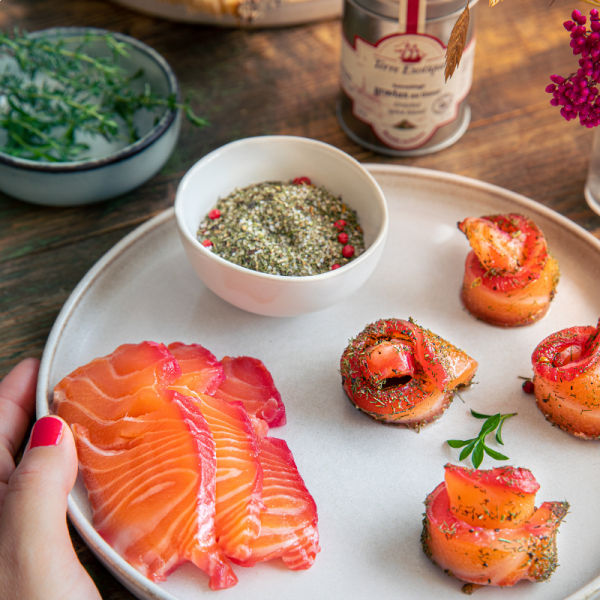





When to use your gravlax mix ?
Explore Terre Exotique’s take on this famous Scandinavian mix
This
gravlax mix was created by our team to make your gravlax marinades super easy.
The Timur berry added to this mix is our very own touch which gives a tangy
burst to your dishes.
How to get the best from your gravlax mix?
Our
recipe ideas for this gravlax mix:
·
Salmon gravlax: discover our Salmon gravlax Terre Exotique recipe;
·
Barbeque cod: marinate your
fillets of cod in 2 tablespoons of gravlax mix for a few hours before grilling
your fish on the barbeque;
·
Brunch smoked
salmon toast: spread some cream cheese on toast, add some smoked salmon and sprinkle
with a couple of pinches of gravlax mix;
·
Fish stock: add a tablespoon
of this gravlax mix to your fish stock;
·
Dips: sprinkle 2 teaspoons
of gravlax mix into Greek yoghurt or cream cheese;
·
Lamb gravlax: rub your lamb with
this gravlax mix and leave to marinate overnight, or for at least 8 hours before
cooking.
Salmon gravlax recipe
Ingredients
1
fillet of salmon (about 1 kg);
160g
Terre Exotique gravlax mix.
Method
Remove
any bones and dry your fillet of salmon with kitchen roll. Rub the fish with the
gravlax mix.
Put
a few spoons of the mix in a ziplock bag then add the salmon, cover with the
rest of the mix then close the ziplock bag. Make sure the bag is placed flat
to ensure the fish is covered in the gravlax mix then weigh it down by
putting a plate on top.
Leave
to marinate in the fridge for 24 hours then cut your salmon into thin slices.
Serve
with pre-dinner drinks or as a starter on blinis with cream cheese and finish
off with a squeeze of lemon juice.
Our tip: You can really
use any type of fish with gravlax – let loose your imagination and surprise
your guests!
The aromas of this gravlax mix
The
dill in this mix releases herby scents whilst the Timur berry gives it acidic
notes with a subtle underlying aroma of pine resin due to the pink berry. This
mix will provide your palate with a burst of sweet and gentle flavours. The Timur
berry brings hints of citrus fruit with notes of grapefruit to enhance your salmon
gravlax, that’s our very own Terre Exotique touch!
The traditional gravlax mix with Terre Exotique’s touch
The
ingredients of this gravlax mix
This
mix is made from sugar, salt, dill, Madagascar black pepper, Timur berry and pink
berry.
The
sugar used in this gravlax mix is our brown cane sugar from La Réunion. This sugar
comes from partially refined sugar cane and contains 5% of molasses, which is
what gives it its blonde colour and its subtle vanilla scent. After the sugar
cane is harvested it is crushed to extract the juice. The juice is then heated
so that the water evaporates, the sugar concentrates and crystallizes.
The
salt used in this mix is Himalayan pink diamond salt from Pakistan which
comes from the Khewra salt mines, at the heart of Himalayas. This jewelled salt
gets is delicate pink colour from its iron content. It is extremely pure, dry
and non-iodized and is rich in minerals and trace elements. These fossilized
crystals of sea salt, commonly known as rock salt, mineral salt, or earth
salt, are unpolluted, additive-free, and unrefined. Consequently, the body
can assimilate 100% of it. These mines are nowhere close to being exhausted -
they still contain 600 million tons of salt!
Dill
or Anethum graveolens is part of
the Umbelliferae or Apiaceae family which includes coriander,
cumin, fennel and carrot. Plants from the Umbelliferae family grow in
a Mediterranean climate and are widespread in temperate regions.
Dill
can grow up to 70 centimetres high, and in summer produces yellow umbrella-like
shaped flowers.
This
aromatic plant grows in the South of France but also in the North if protected
from frost. Dill leaves are harvested in Spring and Summer.
Madagascar
black pepper is the fruit of the Piper
nigrum, from the Piperaceae family. It is harvested in the region of Toamasina.
It releases very aromatic and hot notes. Madagascar black pepper is hand-picked
then sorted by hand, then washed and dried in the sun.
The
Timur berry in this mix comes from Nepal where it grows on small endemic trees
from the Zanthoxylum armatum species from the Rutaceae family. This
little berry is used in all dishes from the Terai lowlands of South Nepal. It
is here in the birth place of Buddha, amongst the Tharu villages of thatched
mud huts that these thorny bushes unfold their treasure.
Once
the annual harvest is finished, the Timur berries are dried then sorted by
hand. Local women sort on average 5 kilos of berries a day on large bamboo
trays. The sorting process involves 3 separate stages: removing branches and
other bits, separating the black seeds from the pericarp, and finally, selecting
the ripest berries based on their colour.
Timur
berry is also known as the “grapefruit pepper ” due to its acidic zesty
notes, but it is also called “Timut pepper”.
Although
pink berry is called pink pepper it is not part of the Piper genus and so it isn’t actually a pepper.
The
scientific name for this pink berry is Schinus
terebinthifolius which is part of the Anacardiaceae family which includes
many trees and shrubs such as sumac, mango or the cashew nut tree.
It
is also known as Bourbon pepper. It grows mainly in Madagascar or La Réunion on
a dioecious tree which can grow up to 10 metres high and is very fast growing.
Only
fully ripened berries are harvested, as they have the strongest aromas. They are
then sorted by the expert hands of the local Malagasy women.
The story behind salmon gravlax
Gravlax
means “buried salmon” in Swedish. This comes from the salmon being buried
under a mix of herbs but mainly from the fact that in the Middle Ages, the Scandinavian
fishermen buried their salmon in the ground along the shores of fjords during
the summer to preserve the fish. This tradition lasted until the 1940’s. Then
each Scandinavian home prepared its own salmon and kept it for several months
in small barrels kept in the cold which contained salt, sugar, pepper and dill
to preserve and flavour the salmon.
| Allergen | Absence |
|---|---|
| Native country | France |
| Ingredients | salt, sugar, dill, black pepper, timur berry (2,5%), pink berry. |
| Nutritional Info | VN Energie pour 100 g (energy for 100g) : 780.9 kJ / 186.8 kcal VN Matière grasse (fat) : 0.4 g Dont acide gras saturés (of which saturated fat) : 0.1 g VN Glucides (carbohydrate) : 44.6 g Dont sucres (of which sugars) : 37.4 g VN Protéines (protein) : 36.4 g Vn Sel (salt) : 1.6 g |
| TRACES EVENTUELLES D'ALLERGÈNES | céleri, sésame, moutarde, fruits à coques. |
 Français
Français 




